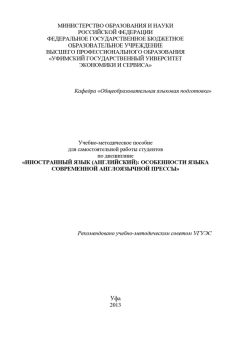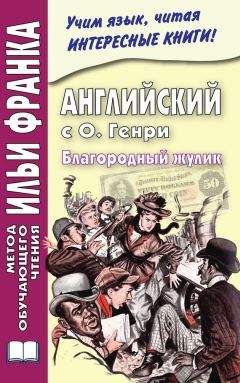Денис Шевчук - Английский для экономистов (учебник английского языка)
Все авторские права соблюдены. Напишите нам, если Вы не согласны.
Описание книги "Английский для экономистов (учебник английского языка)"
Описание и краткое содержание "Английский для экономистов (учебник английского языка)" читать бесплатно онлайн.
Английский для экономистов – учебное пособие предназначено для студентов экономических специальностей и рассчитано на лиц, обладающих знанием нормативной грамматики английского языка и имеющих словарный запас в 2000 лексических единиц.
Английский язык для экономистов состоит из 8 разделов, охватывающих широкий круг тем по экономике и бизнесу: экономика, организация, бизнес, менеджмент, маркетинг, реклама, деньги, банки, финансы, бухучет, аудит, резюме экономиста на английском языке и др. Все тексты взяты из оригинальных английских и американских источников. Разделы (равно как и тексты) могут прорабатываться в представленной последовательности или выборочно – в зависимости от целей, задач и уровня подготовки группы, изучающей английский для экономистов. Это эффективный учебник английского языка для экономистов (деловой английский для экономистов).
Various kinds of MBO systems are used in organizations. Here is an example of how a programme might work in a company. The programme consists of several stages. First, the subordinate’s job is defined. Next, his/her current performance is evaluated. Then, new objectives are developed by the subordinates and their managers. Finally, the programme is put into action. Later, there are periodic reviews of the person’s performance, and his/her progress is checked.
The subordinates and the manager discuss the objectives and make plans for achieving them. The manager may help in some way, perhaps by providing more training for the subordinate or buying more modern machines. From time to time, the subordinate and the manager meet to discuss progress. It is vital that the manager receives feedback from the subordinate on performance and achievements.
There are many benefits of MBO. The system helps the subordinates to see clearly their role in the organization. They have a say in how their job is performed, and what goals should be. Workers feel more responsible and motivated. MBO is a good technique for assessing and individual’s performance. People are judged on results, rather than on the personal feelings and prejudices of the managers.
The main limitations of the system are that it is time-consuming and may create a lot of paperwork. In practice, MBO programmes are often fully supported by managements. This could be because managers are not always skilled at interviewing and giving guidance.
1.Who is the ‘father’ of MBO?
2. What are the principles of the system?
3. How does the programme work?
4. What are the benefits and limitations of the system?
TEXT 5
Read the text. What is the main idea of the text? Divide it into logical parts. Define the key-sentence of each part.
No school, professor or book can make you a manager. Only you can do this, and you can become a manager only by managing. Of course, you can learn the skills that are extremely helpful, particularly in such clearly defined areas as accounting, statistics, law, and finance. But this will not make you a manager. Experience is the only teacher. Experience is, however, is not the uniformly effective teacher. An old aphorism criticizes the person who has worked for 20 years but has only reexperienced the first year 20 times. Learning is not automatic. What schools can do, and what books can do is to provide you with some insights and intellectual tools to be applied against your experience. Most of you are practical people; certainly most managers are. You are concerned about doing things than about thinking about them. You are more concerned with action than with contemplation. Most business students and managers are uneasy about theory. It is abstract and difficult, too unrelated to real problems, it seems, ‘too academic’ and just ‘too theoretical’. But theory is very important because you and all men and women of action are also theorists. No matter how pragmatic you consider yourself, no matter how rooted in reality a manager views himself, you and he operate on theories. You all possess your own theories about motivation, authority, objectives and change. You will need them – and you will have them whether you know it or not. You will be a better manager if you are aware of your assumptions and you examine them periodically and modify them when necessary. Nothing is as practical as a good theory. A great deal of management theory and practice must be described as ‘common sense’. For the objectives of management may be defined as the formulation of priorities and plans.
TEXT 6
MANAGEMENT AS A PROFESSION
The criteria necessary for professional status include three major components:
– An acceptable level of competence in a specified field of knowledge.
– The placing of the interests of society before personal interests in carrying out functions of the profession.
– A code of conduct as behavior imposed upon members and usually enforced internally.
If we examine the field of managementin light of thesecharacteristics, what shall we find out?
Thereis no question that management as a discipline has developed a body of knowledge, which is becoming more and more sophisticated part of the curriculum in many academic institu–tions. Research in the field, particularly in the quantitative and behavioral areas, shows promise of making even more signi–ficant advances in the future. More and more academic institu–tions offering business programs are devoting their primary attention to graduate education in the area of management, with a particular emphasis on both theoretical and practical research. A growing number of business schools are making efforts to integrate faculty move closely with members of the business community so as to apply research findings to actual business problems.
Конец ознакомительного фрагмента.
Текст предоставлен ООО «ЛитРес».
Прочитайте эту книгу целиком, купив полную легальную версию на ЛитРес.
Безопасно оплатить книгу можно банковской картой Visa, MasterCard, Maestro, со счета мобильного телефона, с платежного терминала, в салоне МТС или Связной, через PayPal, WebMoney, Яндекс.Деньги, QIWI Кошелек, бонусными картами или другим удобным Вам способом.
Подписывайтесь на наши страницы в социальных сетях.
Будьте в курсе последних книжных новинок, комментируйте, обсуждайте. Мы ждём Вас!
Похожие книги на "Английский для экономистов (учебник английского языка)"
Книги похожие на "Английский для экономистов (учебник английского языка)" читать онлайн или скачать бесплатно полные версии.
Мы рекомендуем Вам зарегистрироваться либо войти на сайт под своим именем.
Отзывы о "Денис Шевчук - Английский для экономистов (учебник английского языка)"
Отзывы читателей о книге "Английский для экономистов (учебник английского языка)", комментарии и мнения людей о произведении.



















